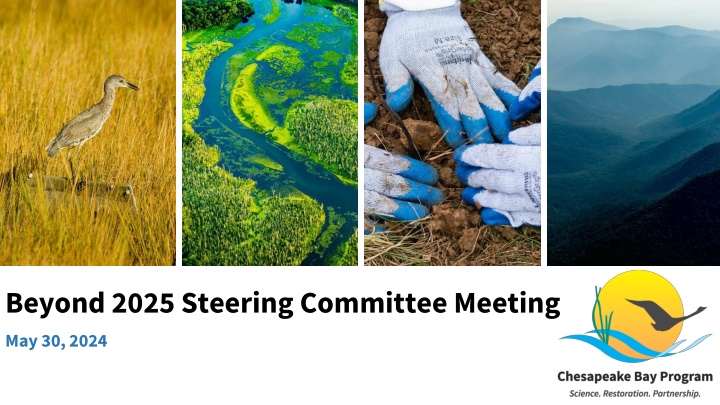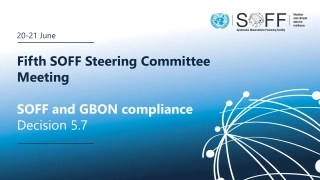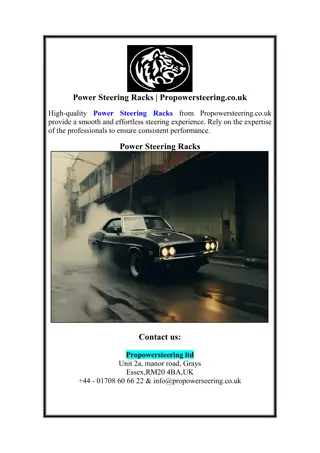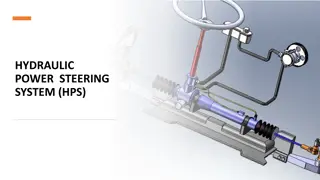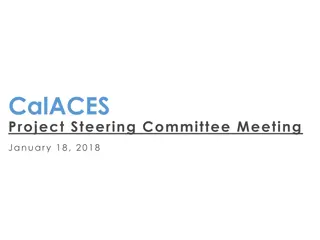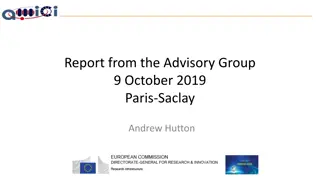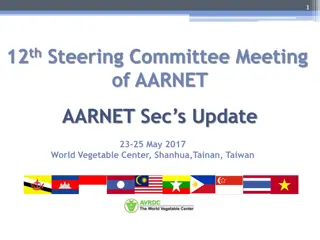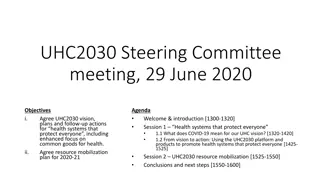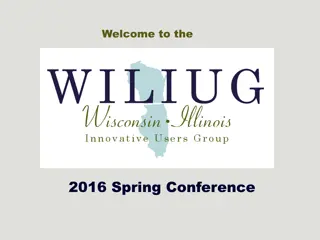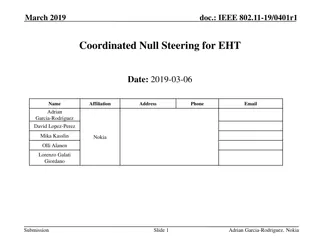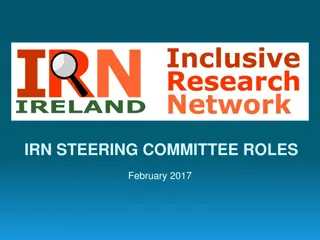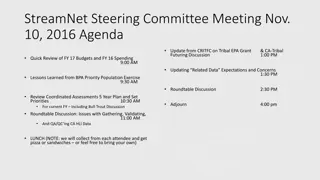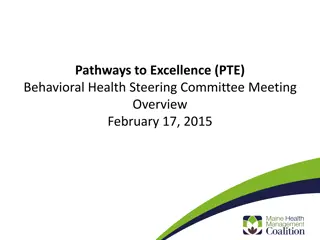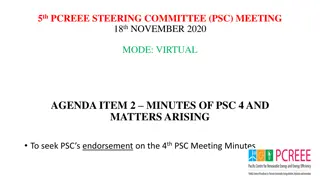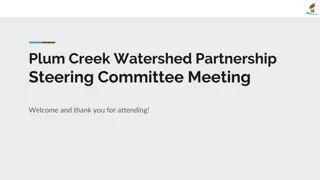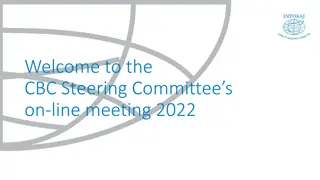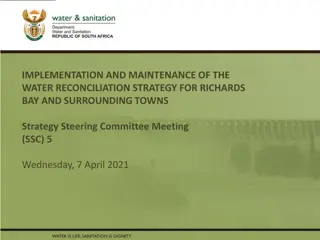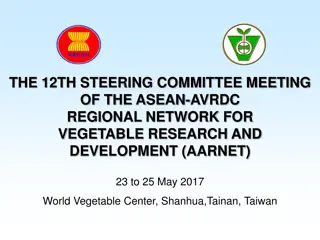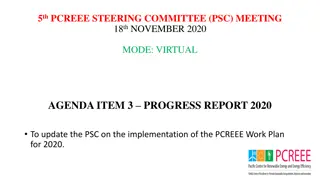Beyond 2025 Steering Committee Meeting Highlights
Describing the outcomes and planned products of the Beyond 2025 steering committee meeting, including discussions on ERG considerations, synthesis narratives, and future phases.
Download Presentation

Please find below an Image/Link to download the presentation.
The content on the website is provided AS IS for your information and personal use only. It may not be sold, licensed, or shared on other websites without obtaining consent from the author.If you encounter any issues during the download, it is possible that the publisher has removed the file from their server.
You are allowed to download the files provided on this website for personal or commercial use, subject to the condition that they are used lawfully. All files are the property of their respective owners.
The content on the website is provided AS IS for your information and personal use only. It may not be sold, licensed, or shared on other websites without obtaining consent from the author.
E N D
Presentation Transcript
Beyond 2025 Steering Committee Meeting May 30, 2024
Agenda Welcome and opening comments ERG Evaluation Report Presentations of Synthesis Narrative Synthesis Discussion: Partnership Lunch Break Synthesis Discussion: Restoration & Conservation Synthesis Discussion: Science Draft EC Charge Response & Remaining Actions Adjourn 10:00a 10:10a 10:50a 11:30a 12:25p 1:10p 2:20p 3:15p 4:00p
Outcomes Thoughts shared on ERG considerations. 1 Full committee discussion and feedback on synthesis narratives 2 Reviewed and received input on the approval process for June. 3
Planned product for EC2024 Page 1 2:Critical Path Forward Our Recommendation (Agreement/Partnership) Our Charge Our Mission: Science. Restoration. Conservation. Partnership. Our Vision for the Partnership Page 3 4: Synthesized, Analyzed summary High-level considerations related to Science High-level considerations related to Restoration and Conservation High-level considerations related to Partnership Our process and what informed our work Summary of public engagement and outreach 4+ pages: Source material One-page summaries from small groups ERG report Partnership Reports
Phase 1 timeline: Updates and considerations ERG: Final Draft to be shared June 18. Steering Committee Draft: Phased approach for initial draft; 2nd draft after public feedback & MB/PSC reviews Public Feedback: July, following acceptance of the Steering Committee draft Delivery and Acceptance MB in October, PSC end of October; EC in December
ERG Considerations What do we get from this - what would you like to see the Program take up in Phase 2? C1. Developing a logic model that works backward from the ultimate goals to appropriate activities incorporating a theory of change that reflects how outcomes can be obtained from activities and outputs. C2. Reducing the number of medium- or long-term outcomes in any changed or future Agreement to better focus the Program at achieving its outcomes. C3. Exploring ways to streamline and simplify the Program s organizational structure to reduce its complexity. C4. Placing an emphasis on eliminating a siloed approach to Program design. C5. Identifying need for and ways to improving Program transparency to all stakeholders. C6. Ensuring an accessible data and information repository. C7. Increasing the use of social science in achieving Program outcomes. C8. Allowing for flexibility in the SRS review cycle. C9. Making recommendations to ensure the Management Board accesses the appropriate expertise and experience during the SRS process. C10. Continuing the reach out to Tribal entities in ways that allow consideration and incorporation of their viewpoints. C11. Finding ways to ensure those working on GITs (or other teams) feel supported in their work.
Process Overview: Narrative Discussions For each Narrative Analysis: 40 minutes: Walk through each synthesis narrative by theme ~10 minute each. Each theme has 1-5 recommendations. Focus on the revisions needed to the recommendations. Full text is available online. 15 minutes: Take pulse checks via Menti on your level of agreement considering the proposed revisions. Strong disagreements will be discussed. Any remaining time: Other observations that have not been captured.
Ground Rules Use the hand icon in Teams to be called on if you have input. One speaker at a time (avoid side conversations). Comments will be spoken (avoid Teams chat). Give everyone a chance to speak. Be mindful of the times in the agenda. We have ~10 minutes/theme. Focus on the recommendation text (in bold) for each topic. Comments to unbolded text (supportive information) may be sent to the writer or put in the Teams chat. When offering edits, explain the why. Tangential discussions will be placed in a parking lot. Avoid word smithing, focus on the intent of the recommendation text.
Synthesis Partnership P1. Adopt a systems approach to streamline governance and structure: P1a. The Steering Committee recommends that the partnership review and revise the Chesapeake Bay Program s governance and structure to reduce complexity and improve adaptive management and decision-making.
Synthesis Partnership P2. Enhance Capacity Building and Technical Assistance through Local Networks: P2a. The Steering Committee recommends embracing the Program s role as a network of networks that connects partners with data, tools, resources and technical assistance that build capacity at the local level.
Synthesis Partnership P3. Strengthen Diversity, Equity, Inclusion and Justice in the partnership and activate the DEIJ Implementation Plan: P3a. The Steering Committee recommends that the Partnership seek ways in which restoration can be relevant to all communities within the watershed by institutionalizing and actualizing the Program s Diversity, Equity, Inclusion and Justice Implementation Plan.
Synthesis Partnership P4. Enhance Communications and Transparency to Foster Long-term Success: P4a. The Steering Committee recommends prioritizing the Partnership's communications and transparency to drive momentum and ensure long- term efficacy.
Pulse Checks on Recommendations Use laptop or phone and go to www.Menti.com, enter code: 3980 2992 Pulse check on the recommendations by narrative synthesis topic. Menti has a character limitation; recommendations are slightly abbreviated. Recommendations in Menti do not reflect revisions made today; rely on our revisions when taking the pulse check. A side-by-side view of Menti and the revisions will be shared on the screen. Sliding scale of level of support: 1 = strongly disagree (far left) 5 = strongly agree (far right) Option to skip or abstain on each recommendation Results will be shared once the SC completes the pulse check Focus remaining time on discussing those with disagreement
LUNCH BREAK WE WILL RETURN AT: 1:10p Beyond 2025 Steering Committee Meeting May 30, 2024
Synthesis Restoration and Conservation R1. Review and refresh existing goals, outcomes and management strategies to more effectively guide the partnership s restoration efforts beyond 2025: R1a. The Steering Committee recommends adapting some outcomes to be more compatible with and realistic in the face of anticipated future landscape conditions, accounting for climate and projected land use change. R1b. The Steering Committee recommends streamlining the Agreement structure to reduce complexity and improve integration and efficiency of restoration efforts.
Synthesis Restoration and Conservation R2. Support System-Scale Conservation and Restoration Planning for Vital Habitats: R2a. The Steering Committee recommends that conservation should be elevated as a key guiding pillar for the Bay Program, alongside Science, Restoration and Partnership. R2b. The Steering Committee recommends prioritizing the restoration of habitats along our tributary rivers and streams, as well as the Bay s nearshore waters some of the most important places for the people of the watershed and the most productive habitats for our living resources.
Synthesis Restoration and Conservation R3. Improve the Program s holistic approach to planning, prioritization, progress-tracking and accountability: R3a. The Steering Committee recommends developing and adopting approaches to better incentivize practices that deliver multiple benefits. R3b. The Steering Committee recommends enhancing the local benefits of Chesapeake restoration by improving alignment with state and local plans and priorities. R3c. The Steering Committee recommends improving progress-tracking and accountability to further support efforts to adaptively manage and better target or prioritize resources and technical assistance.
Synthesis Restoration and Conservation R4. Build capacity to deliver technical assistance and community engagement through improved coordination and collaboration: R4a. The Steering Committee recommends building collective capacity for restoration through improved coordination and collaboration between existing programs, across multiple levels of government, and with new partners.
AFTERNOON BREAK WE WILL RETURN AT: 2:20p Beyond 2025 Steering Committee Meeting May 30, 2024
Synthesis Science S1. Prioritize research that addresses knowledge gaps in existing and emerging challenges: S1a. The Steering Committee recommends prioritizing climate science to enhance understanding of anticipated changes and restoration/conservation practices that can adjust to those changes. S1b. The Steering Committee recommends a greater focus on conducting social science research and applying its findings to ensure restoration and conservation efforts align with the well-being of people.
Synthesis Science S2. Integrate existing and new science findings in decision making, resource allocation, and communication strategies: S2a. The Steering Committee recommends the need to better adapt to these findings and communicate how they are integrated into decision making, resource allocation, and management strategies. S2b. The Steering Committee recommends increased efforts to integrating traditional indigenous knowledge and co-producing science with Native nations.
Synthesis Science S3. Optimize monitoring, modeling, and analysis: S3a. The Steering Committee recommends a partnership approach to establish a sustainable, long-term funding plan to maintain critical enhancements in monitoring. S3b. The Steering Committee recommends amendments to outcomes require a clear target and development of a monitoring plan because these factors are essential for assessing progress toward a healthy Bay and watershed. S3c. The Steering Committee recommends [in addition to CAST] incorporating multiple lines of evidence in the process to evaluate progress towards multiple goals. S3d. The Steering Committee recommends that all modeling efforts should integrate climate change projections to better understand changes across multiple indicators and inform strategic planning at the local and state level. S3f. The Steering Committee recommends focusing on local scales and analyzing stressor metrics (e.g., toxics, climate change, bacteria) alongside data on the response to the stressor.
Synthesis Science S4. Build Chesapeake Bay Program knowledge and capacity to apply scientific findings: S4a. The Steering Committee recommends strengthening its capacity to apply its [wealth of scientific data and] findings effectively. S4b. The Steering Committee recommends establishing better access and collaboration [for new tools in development]. S4c. The Steering Committee recommends expanding its climate science support team and social science staff and dedicate funding for the strategic application of these topics.
Planned product for EC2024 Page 1 2:Critical Path Forward Our Recommendation (Agreement/Partnership) Our Charge Our Mission: Science. Restoration. Conservation. Partnership. Our Vision for the Partnership Page 3 4: Synthesized, Analyzed summary High-level considerations related to Science High-level considerations related to Restoration and Conservation High-level considerations related to Partnership Our process and what informed our work Summary of public engagement and outreach 4+ pages: Source material One-page summaries from small groups ERG report Partnership Reports
Critical Path Forward: Vision Page 1 2:Critical Path Forward Our Recommendation (Agreement/Partnership) Our Charge Our Mission: Science. Restoration. Conservation. Partnership. Our Vision for the Partnership A)Prepare and present a revised vision statement to the EC for the December 2024 EC Meeting, or B)Suggest that a revision be discussed and drafted as part of Phase 2.
Integration Release for Public Feedback Page 1 2:Critical Path Forward Our Recommendation (Agreement/Partnership) Our Charge Our Mission: Science. Restoration. Conservation. Partnership. Our Vision for the Partnership Delivery to MB / PSC June SC Fatal Flaw Review Page 3 4: Synthesized, Analyzed summary High-level considerations related to Science High-level considerations related to Restoration and Conservation High-level considerations related to Partnership Our process and what informed our work Summary of public engagement and outreach June Draft Shared May SC Review & Discussion May Draft Shared 4+ pages: Source material One-page summaries from small groups ERG report Partnership Reports Drafting Team
Schedule for Public Release Tue Sun Mon Wed Thu Fri Sat 26 27 28 29 30 WE ARE HERE 31 1 JUNE 2 3 4 SC Feedback Due on Synthesis Narrative Partnership BLUF Released 5 6 7 8 Revisions by Drafting Team / Co-Chairs SC 9 10 11 SC Feedback Due on Partnership BLUF 12 13 14 15 Revisions by Drafting Team / Co-Chairs 16 17 18 Release Final Draft EC Charge Response 19 20 21 22 SC 23 24 25 PSC Meeting 26 27 B25 SC Meeting 28 29 30 1 JULY Release ASAP 2 3 4 5 6
June Agenda & Consensus Extended Meeting Hold to Four Hours Welcome & Opening Comments (40 min) Receive Final B25 Report Recap June PSC Draft EC Response Consensus Review (~3 hours + break time) Consensus Process Overview Initiate Consensus working from Synthesis to BLUF
